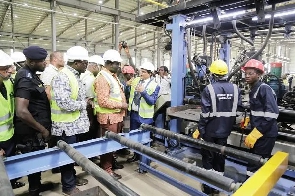 The department currently has only 54 inspectors across the country
The department currently has only 54 inspectors across the country
The Department of Factories Inspectorate (DFI) says an estimated 800 inspectors are required to effectively oversee the supervision of factories’ health and safety needs nationwide.
The department currently has only 54 inspectors across the country, and says it will need over 700 new hands in order to effectively carry out its mandate.
Acting Chief Inspector of Factories, George Gashon, told B&FT that the penetration rate of factories across the country vis-à-vis shortage in the number of inspectors is creating a challenge for the department.
“With all the 16 regions, we should ideally have about 800 safety inspectors for factories in the country. The deficit is something we are working to soon rectify,” Mr. Gashon said.
1D1F initiative
The DFI disclosed that despite renewed industrialisation efforts by government through the One District-One Factory (1D1F) programme, only a handful of such factories have safety inspectors deployed by the department due to its deficit.
As of April 2022, President Nana Akufo-Addo announced that 107 factories had been established under his government’s flagship industrialisation programme, with over 200 others at various stages of completion.
Apart from the 1D1F projects, a number of industrial establishments are springing up across the country, especially on the back of implementing the African Continental Free Trade Area (AfCFTA).
However, efforts to expand the country’s industrial base have failed to effectively staff a key sector agency like the DFI, essentially needed to enforce health and safety parameters in the country.
The huge staff deficit at the DFI, a strategic state agency according to market watchers, could jeopardise the country’s hopes of becoming a leading industrial force within the continental free market if not addressed urgently.
Why safety at factories matters
The genesis of most disastrous accidents among global industries, in both the present and past, can be traced to either absence or weak implementation of occupational health and safety management systems.
Despite the familiarity of occupational health and safety concepts, organisations across different sectors continue to record huge losses and inefficiencies due to high rates of job-related illness and injuries.
A report by the International Labour Organisation (ILO) on ‘employees’ health and safety’ in 2015 states that industries need to invest more effort toward improvements for employees’ health and safety at work.
According to the report, over 2.3 million occupational accidents occur annually around the world, and out of this number an estimated death-count of over 6,000 employees is recorded daily.
Specifically, developing countries continue to record more huge losses in work-related accidents than the developed economies.
Ghana falls within these developing countries, with an estimated accident rate at 15,702 per 100,000 workers; and fatal accidents at 1,852 with a fatality rate of 20 per 100 workers across industries.
Data from the DFI suggests that occupational accidents and work-related injuries for the period 2000–2010 cost Ghanaian industries an estimated amount of GH¢3.5million. Statistics on amounts spent on injuries by local industries for the next decade, from 2010-2020, were estimated to be more than triple the amount reached in 2010.
Despite these staggering figures, safety issues do not seem to be one of the topmost priorities for many local industries – due to reasons such as lack of comprehensive health and safety policies, poor infrastructure, and the insufficient number of qualified safety personnel.
The impending National Safety Authority bill
An impending National Safety Authority bill is expected to be approved soon by parliament, according to the DFI, and it will ensure all state-owned and private factories have qualified safety inspectors to establish security and prohibit faulty industrial machines from operating.
“All factories without safety officers are welcomed onboard to cooperate with the department to make factories safer. We will regulate all organisations to have well-trained safety officers in order to present an accident-free working environment,” Mr. Gashon noted.
The Department of Factories Inspectorate is mandated by Act 328 of 1970 to conduct a technical safety, health and welfare inspection regularly of all premises within the country to ascertain compliance with the law.
Unfortunately, however, the shortage of safety inspectors according to safety stakeholders implies that many factories operating in Ghana are doing so without the required safety regulations being enforced.